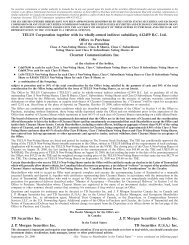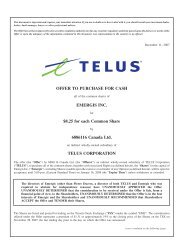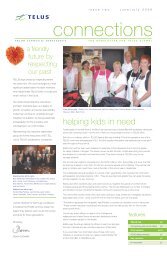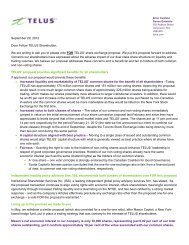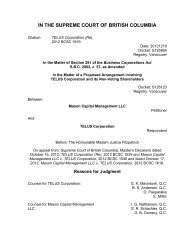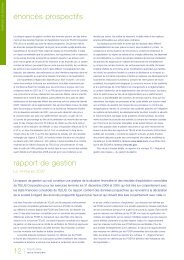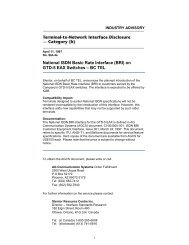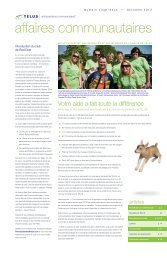Information Circular - About TELUS
Information Circular - About TELUS
Information Circular - About TELUS
You also want an ePaper? Increase the reach of your titles
YUMPU automatically turns print PDFs into web optimized ePapers that Google loves.
5 APPrOvAL<br />
The Arrangement<br />
OF THE ArrANGEMENT<br />
At the Meeting, we will ask you to vote to eliminate <strong>TELUS</strong>’ dual<br />
class share structure, to be effected by way of a court-approved<br />
Arrangement. Each holder of Common Shares and each holder<br />
of Non-Voting Shares will be entitled to vote for or vote against<br />
the Arrangement.<br />
Under the terms of the Arrangement, each Non-Voting<br />
Share outstanding as of the Effective Time, would be converted<br />
into a Common Share on a one-for-one basis. Following the<br />
conversion, the Non-Voting Shares would be eliminated from the<br />
authorized share structure of <strong>TELUS</strong>. As a result, immediately<br />
following the Effective Time, the Common Shares would be<br />
<strong>TELUS</strong>’ sole class of outstanding equity securities.<br />
The principal conditions to the effectiveness of the Arrangement<br />
include the receipt of required Shareholder approvals of the<br />
Arrangement Resolution and the receipt of Court approval in<br />
the Final Order. If all conditions to the effectiveness of the<br />
Arrangement, including those set out in the Final Order and the<br />
Arrangement, are satisfied, or to the extent possible, waived,<br />
it is currently contemplated that the Arrangement will be<br />
implemented on or about May 16, 2012.<br />
The description of the Proposal and the Arrangement set out<br />
in this section of the <strong>Circular</strong> is qualified in its entirety by reference<br />
to the full description of the Proposal and the Arrangement on<br />
pages 92 to 110 of this <strong>Circular</strong>.<br />
background<br />
<strong>TELUS</strong>’ dual class share structure was introduced in 1999<br />
to deal with foreign ownership rules at a time when <strong>TELUS</strong>’<br />
Shareholder base included a significant non-Canadian<br />
Shareholder, namely GTE (which subsequently merged with<br />
Bell Atlantic to create Verizon).<br />
<strong>TELUS</strong>’ dual class share structure, together with special<br />
rights and ownership restrictions, was an important tool<br />
that enabled <strong>TELUS</strong> to manage compliance both with the foreign<br />
ownership restrictions prescribed by the Telecommunications<br />
Act, and with foreign ownership restrictions under the<br />
Radiocommunication Act and the Broadcasting Act to which<br />
the Company became subject in 2005 as a result of new<br />
business undertakings.<br />
10 . <strong>TELUS</strong> 2012 information circular<br />
The principal difference between the Common Shares and<br />
the Non-Voting Shares is that the Non-Voting Shares do not<br />
possess full voting rights. Notwithstanding that both classes<br />
of Shares are entitled to the same dividend, are widely held<br />
and have similar liquidity, the Non-Voting Shares have historically<br />
traded on the TSX and the NYSE at a discount to the trading<br />
price of the Common Shares. Over the past three years, the<br />
average discount in the trading price of the Non-Voting Shares<br />
relative to the trading price of the Common Shares has been<br />
approximately 4.5 per cent. Eliminating the dual class share<br />
structure would eliminate that gap.<br />
The Company therefore determined that a collapse of the<br />
dual class share structure warranted careful consideration.<br />
In the months of December 2011 and January 2012, management<br />
analyzed the matter and prepared a submission to the Board in<br />
relation to the Proposal. The Company consulted Osler with<br />
respect to legal matters relating to the Proposal. The Board in<br />
turn determined on January 25, 2012 that a Special Committee<br />
should be established to carefully consider the implications of<br />
the Proposal, whether to proceed with the Proposal and, if so,<br />
the most appropriate way to implement the Proposal.<br />
recommendations of the Special Committee<br />
and the board of Directors<br />
The Special Committee, which consists of Brian Canfield<br />
(Chair of the Special Committee), Charlie Baillie, John Butler,<br />
Rusty Goepel, John Lacey and Bill MacKinnon, has carefully<br />
considered the implications of the Proposal and the most<br />
appropriate way to implement the Proposal. The Special<br />
Committee retained Scotia Capital as independent financial<br />
advisors to assist it in evaluating the Proposal. In this regard, the<br />
Special Committee and the Board received a Fairness Opinion<br />
from Scotia Capital to the effect that a one-for-one conversion<br />
ratio is fair, from a financial point of view, to the holders of Non-<br />
Voting Shares and to the holders of Common Shares. The<br />
Special Committee unanimously concluded that the Arrangement<br />
is in the best interests of <strong>TELUS</strong> and is reasonable and fair in<br />
the circumstances. It therefore recommended, based on the<br />
considerations set out in this <strong>Circular</strong>, that the Board approve<br />
the Arrangement and recommend to Shareholders that they<br />
vote in favour of the Arrangement Resolution.<br />
After considering, among other things, the recommendation<br />
of the Special Committee and the Fairness Opinion, the<br />
Board unanimously concluded that the Arrangement is in



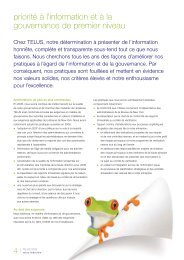
![DISK004:[98CLG6.98CLG3726]BA3726A.;28 - About TELUS](https://img.yumpu.com/16786670/1/190x245/disk00498clg698clg3726ba3726a28-about-telus.jpg?quality=85)
